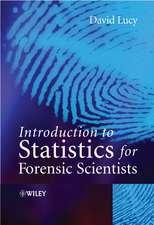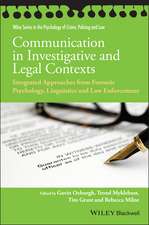Investigation and Prevention of Financial Crime: Knowledge Management, Intelligence Strategy and Executive Leadership
Autor Petter Gottschalken Limba Engleză Hardback – 28 oct 2010
| Toate formatele și edițiile | Preț | Express |
|---|---|---|
| Paperback (1) | 241.90 lei 6-8 săpt. | |
| Taylor & Francis – 14 oct 2024 | 241.90 lei 6-8 săpt. | |
| Hardback (1) | 822.34 lei 6-8 săpt. | |
| Taylor & Francis – 28 oct 2010 | 822.34 lei 6-8 săpt. |
Preț: 822.34 lei
Preț vechi: 1104.23 lei
-26% Nou
Puncte Express: 1234
Preț estimativ în valută:
157.38€ • 163.69$ • 129.92£
157.38€ • 163.69$ • 129.92£
Carte tipărită la comandă
Livrare economică 14-28 aprilie
Preluare comenzi: 021 569.72.76
Specificații
ISBN-13: 9781409403319
ISBN-10: 1409403319
Pagini: 268
Dimensiuni: 174 x 246 x 23 mm
Greutate: 0.59 kg
Ediția:1
Editura: Taylor & Francis
Colecția Routledge
Locul publicării:Oxford, United Kingdom
ISBN-10: 1409403319
Pagini: 268
Dimensiuni: 174 x 246 x 23 mm
Greutate: 0.59 kg
Ediția:1
Editura: Taylor & Francis
Colecția Routledge
Locul publicării:Oxford, United Kingdom
Public țintă
AcademicNotă biografică
Professor Petter Gottschalk gained the degrees of Master of Business Administration at the University of Berlin and Master of Science at Dartmouth College and Massachusetts Institute of Technology, in the USA. His Doctorate in Business Administration was gained at Brunel University in the UK. Petter Gottschalk is currently Professor of Information Systems and Knowledge Management at the Norwegian School of Management in Oslo. He is also a lecturer and supervisor at the Norwegian Police University College, where he teaches executive classes on knowledge management in policing, intelligence strategy, and policing organized crime. His current research is into knowledge sharing in police investigations, and police misconduct. Professor Gottschalk spent five years in business, at Managing Director level, in IT related industries.
Cuprins
Introduction; Chapter 1 Financial Crime Categories; Chapter 2 Knowledge Management; Chapter 3 Intelligence Sources; Chapter 4 Information Systems; Chapter 5 Intelligence Strategy; Chapter 6 Regulation and Response; Chapter 7 Investigating Financial Crime; Chapter 8 Executive Leadership; Chapter 9 Prevention Strategy; Chapter 10 Corporate Social Responsibility; Chapter 11 Information Technology Strategy; Chapter 12 Applying Investigative Knowledge; Chapter 13 Conclusion;
Recenzii
'This theoretical reference frame is an important prerequisite for enlightened discussions and reflections. This book contains important findings about methods to combat financial crime and can support police organizations and relevant authorities aiming to prevent this type of crime.' - Dr. Stefan Holgersson, Växjö University, Sweden. 'The book provides a unique insight into the practice and investigation of financially motivated crime. First a comprehensive overview of different types of financial crime in the context of knowledge management is provided, offering a unique perspective on the adoption of strategies to prevent such crime as well as investigative techniques that might be employed to combat financial criminal activity. The book will serve as a useful reference for police practitioners, those working in the criminal justice system and researchers interested in this area.' - Professor Julia C. Davidson, Director of Research in Criminology, Kingston University, UK
Descriere
Petter Gottschalk considers how, in some competitive environments, goals can 'legitimise' all kinds of means, and how culture can exert a role in relation to what is seen as acceptable or unacceptable behaviour by individuals. In Investigation and Prevention of Financial Crime he provides expert advice about strategies for the use of intelligence to combat financial crime. The uniqueness of his approach to the subject lies in the way he is able to explain intelligence and intelligence processes in the wider context of knowledge and knowledge management. The numerous case studies throughout the book illustrate the 'policing' of financial crime from an intelligence, knowledge management and systems perspective.













